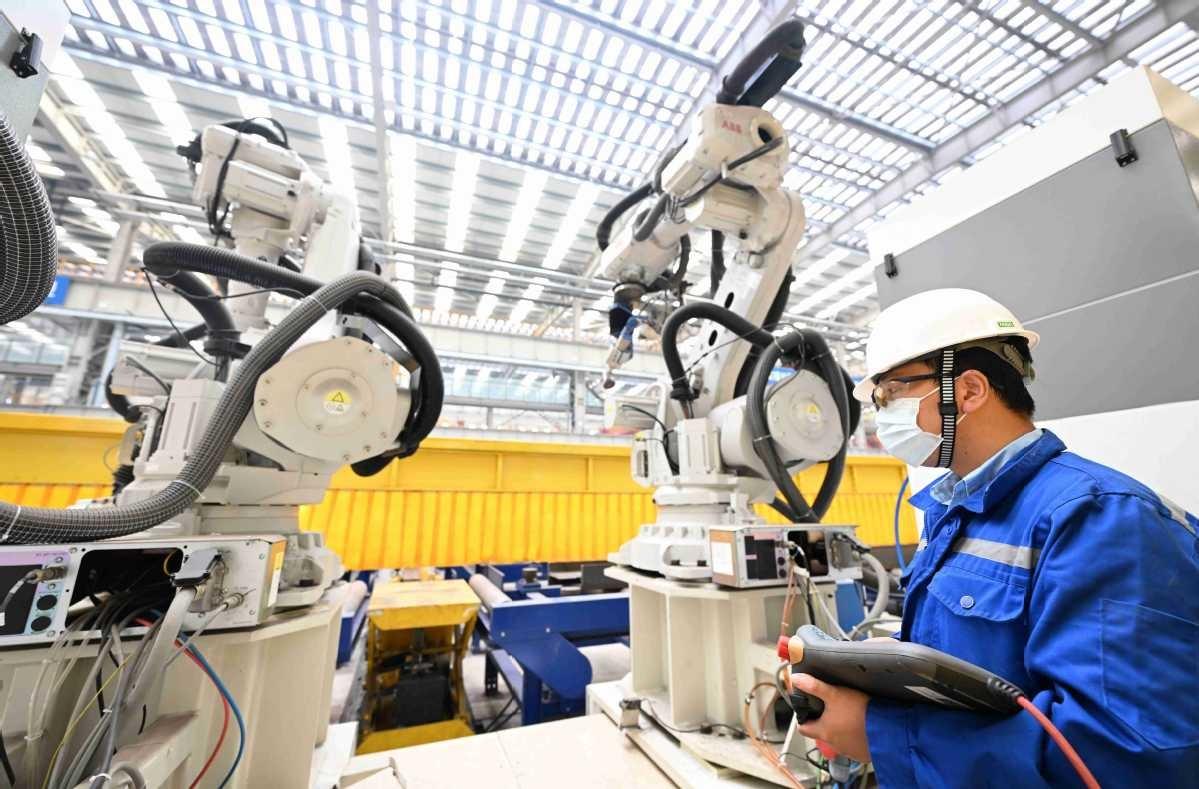Stronger policy support needed on macro level to benefit market players, analyst says
 An employee works at a smart production facility in Tianjin. (PHOTO / XINHUA)
An employee works at a smart production facility in Tianjin. (PHOTO / XINHUA)
China's factory activity expanded at a slower pace in June, a private survey showed on Monday, pointing to the strains on the manufacturing sector due to still-weak demand and highlighting the need to step up countercyclical policy adjustments.
Analysts said that while China's economy has stabilized and improved since the start of the year, the weak purchasing managers index highlighted the headwinds facing the broader economy. They called for both short-term stimulus measures and long-term solutions to deal with the structural issues.
The Caixin China General Manufacturing PMI — which gauges operating conditions in the sector — came in at 50.5 in June after 50.9 in May, above the 50-point mark that separates growth from contraction, media group Caixin said on Monday.
Wang Zhe, a senior economist at Caixin Insight Group, said that China's factory activity expanded for a second consecutive month in June on slightly improved supply and demand.
Referring to the 12-month outlook for output, manufacturers polled by Caixin expressed their optimism, supported by hopes that economic conditions and sales will improve. However, business confidence for the coming 12 months slipped to an eight-month low in June, as some manufacturers expressed concerns over relatively sluggish market conditions.
"A slew of recent economic data suggests that China's recovery has yet to find a stable footing, as prominent issues including a lack of internal growth drivers, weak demand and dimming prospects remain," Wang said.
Wang added that Caixin's manufacturing PMI for June also points to issues such as an increasingly dire job market, rising deflationary pressure and waning optimism.
"In the future, stronger policy support is needed on the macro level, along with higher implementation efficiency from a micro perspective, to ensure that policies benefit market players directly and therefore bolster employment and market expectations," Wang said.
Data released by the National Bureau of Statistics last week shows the pressures facing the economy, with the official PMI for China's manufacturing sector remaining in the contraction zone for the third consecutive month after ticking up to 49 in June from 48.8 in May.
China's nonmanufacturing PMI came in at 53.2 in June, down from 54.5 in May, according to the NBS.
Lu Ting, chief China economist at Nomura, said that his team expected manufacturing PMI to remain in contractionary territory in July, due to ongoing property woes and external challenges, while the nonmanufacturing PMI could weaken further on fading post-COVID pent-up demand for in-person services.
"Amid the worsening downward spiral of major activity data, we expect the government to introduce a raft of supportive measures after the moderate 10-basis-point rate cut last month and believe it will increasingly play the role of borrower and spender," he said. "We see a step-by-step policy response as more likely."
Ning Jizhe, vice-chairman of the China Center for International Economic Exchanges, told a meeting on Friday that China's GDP growth rate for the first half of the year will likely reach around 6 percent, and the country has the conditions and capability to meet its annual growth target of around 5 percent this year.
Despite the challenges and difficulties ahead, Chinese manufacturers expressed strong optimism about China's steady growth.
She Shangfeng, vice-president of Great Wall Motor, a pickup manufacturer and global leader in intelligent new energy SUVs, said he still has a rosy outlook for the development of the automotive sector as well as the broader economy. "We will continuously invest in emerging fields including the new energy vehicles as well as digital and smart development," he told China Daily on the sidelines of the World IoT Top 500 Summit, which was held on Monday in Beijing.
Huang Ying, vice-president of Chinese tech heavyweight Lenovo Group, also expressed strong confidence in its business in the second half of the year, given the rising demand for new technologies and services in fields such as artificial intelligence.
ouyangshijia@chinadaily.com.cn


